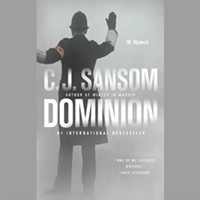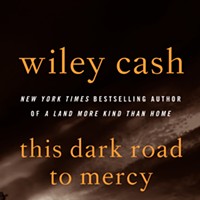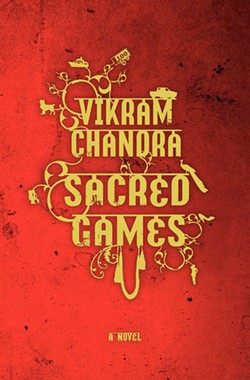When Ganesh Gaitonde discovers one of his henchmen has betrayed him, it prompts a typically sanguinary response.
Gaitonde's men drag the betrayer through a suburban neighborhood to the top of a nearby hill. Gaitonde brandishes a sword and chops off an arm. His deputies do the rest, eliciting surging jets of blood and anguished cries.
"Then I walked down the hill, to my basti, to my home," Gaitonde recalls. "In the mirror in the alcove immediately to the right of the door, I saw that my shirt was ruined, splashed all over with blood. I took it off, and also my trousers, soggy to the front, and my damp shoes. I took a bath with hot water. I ate a little ... and drank a glass of milk with almonds in it. Then I slept."
Don't wrack your brain trying to recall Gaitonde's best-selling memoir or his chilling chat with Larry King on CNN.
Gaitonde, the boss of India's famed G-Company, is the creation of Vikram Chandra. The mafia don's poignant, profane recollections alternate with a traditional third-person narrative encompassing everything from an end-of-the-world thriller to the pleasures of chai tea and tandoori chicken in Sacred Games, Mr. Chandra's sweeping, sprawling and jaw-dropping new novel. It is, more than anything else, literary magic, the kind of story you savor, dreading its inevitable end. In that sense, it reminded me of Larry McMurtry's Lonesome Dove, though 19th century Texas and millennial Mumbai, and their attendant sagas, couldn't be any further apart.
Industry hype leading up to the January release of Sacred Games has centered on Chandra's lucrative advance after publishers scrambled to acquire rights, as well as winning bidder HarperCollins' carefully constructed promotional strategy to curry favor with readers.
Forget all that. Sacred Games is monstrously entertaining, conjuring images of a literary duet between John Irving and Vikram Seth with a dollop of Mario Puzo thrown in for good measure.
Expect critics and readers to gush over Gaitonde as soon as they get their hands on Sacred Games. He's a stunning creation: a real-life monster, simultaneously sinister and sympathetic. Corpses pile up around him, the result of ordered hits, spur-of-the-moment homicides, gang wars, police shootouts. It is a rare occasion that the spilling of so much blood, even that of his young son, distracts Gaitonde for long, if at all.
At the same time, his insecurities and desperate, pathetic attempts to connect with anyone -- even prostitutes -- elicit empathy. Gaitonde is no dummy, and his sense of humor is sharp. Amazingly enough, he becomes hard not to like after awhile.
Like the best storytellers, Chandra succeeds because he colors in furious grays: Heroes and villains are never what they seem, nuance complicates everything, and no one's motives can be defined as pure.
Fittingly, Gaitonde runs his various illegal activities from jail cells and yachts alike, all the while scrambling to answer his satellite phone and discuss existential longings with a beloved TV guru (think Deepak Chopra in a fit of soothing apocalyptic rage).
The legendary gangster's fate isn't a mystery. Forty-four pages into Chandra's 900-page epic, Gaitonde blows his head off in the basement of a safe house in Mumbai, the teeming, corrupt city that serves as the novel's central character. His body is discovered by Sartaj Singh, a cynical, mildly corrupt idealist and veteran cop.
If nothing else, readers of Sacred Games will have little trouble mastering India's profane arts after finishing Chandra's blistering novel. Mumbai's slang and colloquialisms spice up every page. Despite a partial glossary included in the back of the book, some phrases remain international mysteries even as many others are readily apparent. Somehow, Chandra pulls all this off without distracting or frustrating an American reader too much, though there may be a surfeit of lyrical references from various Bollywood numbers (note to author: How about a little U2 next time?).
Tracing the paths of Singh and Gaitonde -- and the worlds they inhabit -- on their collision course provides entrée into the cacophony of Mumbai. From teeming trains to impoverished neighborhoods, from petty bribes to political duplicity, here lies the city's head-spinning exuberance -- and exhaustion.
Chandra prefers pointillism to broad strokes, adopting the Tolstoyan method many attempt but few achieve. His novel serves up delights along the side roads. In but one of many such examples, here is a typically Chandrian detour, this one into the heart of Mary Mascarenas, a hair-stylist musing on fashion cycles.
"The cuts came and went, and bangs were down one year and up the next and four years later descended again," Chandra writes. "What was in this season was sure to be out next. Blonde came and went, and short efficiency was followed by long femininity. Mary was sure that the morning after the oldest profession was invented, the professional went looking for a stylist."
Chandra himself never lacks for style -- or substance. Without seeming to break a sweat in the broiling heat of Mumbai, he gathers up the bursting city without turning eloquence into grandiloquence. Social mores, dirty jokes and idiosyncrasy abound. Did I mention the secret agent who knits to relieve stress?
It's all here, tucked behind Singh's traffic-jam epiphanies and Gaitonde's Stairmaster workouts: Pakistani battles; terrorism; religious wars among Hindus, Muslims and Sikhs; Bollywood ambition; nuclear annihilation; bureaucratic bungling; and, finally, covert collaborations between criminals and intelligence agencies with little to distinguish their differences.
Fear not, Saab. This isn't a book with an overbearing message -- or even a geopolitical one. It is the rarest of creations, an irresistible story that you simply cannot keep out of your head, one that enthralls and entertains long after you have stayed up too late reading, vowing to stop after just one more chapter.
Go ahead. Close the book, turn out the lights. Even then, Ganesh Gaitonde, Sartaj Singh and their many friends and enemies will whisper in your ear, beckoning from Mumbai and its jarring, joyous madness.
Talk about an offer you can't refuse.
Sacred Games
by Vikram ChandraHarperCollins, $27.95, 916 pages
Speaking of 2.50000
-

Totalitarians R Us
Nov 21, 2007 -

The Gravity Girls
Sep 19, 2007 -
Politics + Money = Corruption
Jul 18, 2007 - More »
Latest in Books
More by Erik Spanberg
-

Book review: Natchez Burning
Jul 2, 2014 -

Book review: Dominion
May 16, 2014 -

Book review: Wiley Cash's This Dark Road to Mercy
Mar 21, 2014 - More »
Calendar
-

NEW WINDOW GALLERY-Pat Rhea-ACRYLIC PAINTINGS-April 05-30 2024 VALDESE, NC 28690 @ New Window Gallery/Play It Again Records
- Through April 30, 12 p.m.
-

WHISKEY TASTING: VIRGINIA HIGHLANDS WHISKY @ Elizabeth Parlour Room
-
An Evening With Phil Rosenthal Of "Somebody Feed Phil" @ Knight Theater
-
Kountry Wayne: The King Of Hearts Tour @ Ovens Auditorium
-

Trap & Paint + Karaoke @ Zodiac Bar & Grill
-
The joy and pain of comedian Oletha Cuevas 2
-
Charlotte Symphony Teams with Punk Violinist
Flaming redhead torches Red Priest
-
Georgie Nakima Connects Communities with Environment Through Art
Bridging the gap












